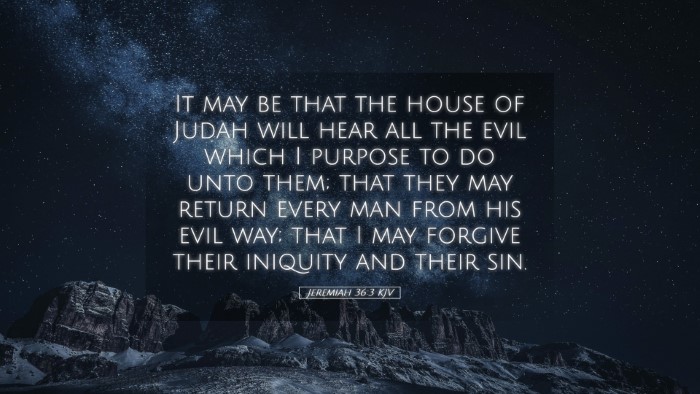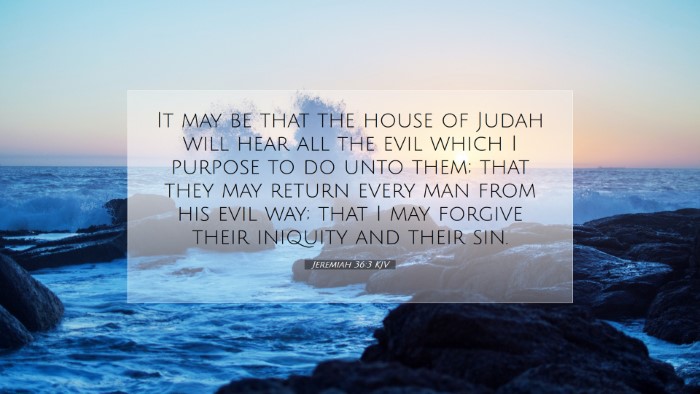Bible Commentary on Jeremiah 36:3
Jeremiah 36:3 states:
"It may be that the house of Judah will hear all the evil which I purpose to do unto them, that they may return every man from his evil way; that I may forgive their iniquity and their sin."
Contextual Overview
This verse is situated within the prophetic ministry of Jeremiah during a tumultuous period in Judah's history. The backdrop includes the impending Babylonian invasion and the moral decay of Judean society. As such, Jeremiah is called to deliver God’s message of impending judgment but also of potential restoration and forgiveness.
Theological Themes
- Divine Mercy: The willingness of God to forgive those who turn from their sin highlights the theme of divine mercy. As Matthew Henry notes, this reflects God's ultimate goal of reconciliation rather than mere punishment.
- Call to Repentance: The verse encapsulates the prophetic call to repentance. Clarke emphasizes that the purpose of proclamation is to prompt awareness of sin, which leads to a transformation of the heart and life.
- The Role of Repentance: Barnes asserts that true repentance is a precursor to forgiveness, underscoring the necessity for the people of Judah to actively turn from their ways to receive God’s mercy.
Commentary Insights
Matthew Henry
Henry observes the compassionate nature of God, who desires that all should come to repentance (cf. 2 Peter 3:9). He notes that the purpose behind the warnings is not to inflict punishment but to lead the people to a place of salvation. This reflects God's character, offering opportunities for change and restoration.
Albert Barnes
Barnes points out that the phrase "that I may forgive their iniquity and their sin" articulates God's readiness to forgive, emphasizing the depth of God’s love. He also comments on how this passage serves as a reminder that even in the face of judgment, God holds out the hope of forgiveness, asserting that repentance opens the door to divine grace.
Adam Clarke
Clarke discusses the significance of God's intention for the people of Judah to hear the proclamations made through Jeremiah. He highlights that the divine intention is for them to recognize their wrongdoing and seek restoration, emphasizing that God’s covenants necessitate their response to His call.
Practical Application
- For Pastors: This verse serves as a powerful reminder that the message of repentance should always be coupled with a promise of forgiveness. Pastors are encouraged to teach congregants about God’s unfailing mercy and the importance of returning to Him.
- For Students and Theologians: The theological implications of this verse provide rich material for reflection on the nature of God’s justice and mercy. It raises essential questions about the relationship between divine judgment and human responsibility.
- For Bible Scholars: Scholars are challenged to explore the historical context of Jeremiah’s ministry, analyzing how contemporary events influenced the prophecies and their reception among the people of Judah.
Conclusion
Jeremiah 36:3 deeply resonates with the themes of repentance, divine mercy, and the restorative nature of God’s interaction with humanity. It encapsulates the urgency of turning towards God for forgiveness and challenges believers across generations to embrace the call to repentance as a pathway toward restored relationship with their Creator.


